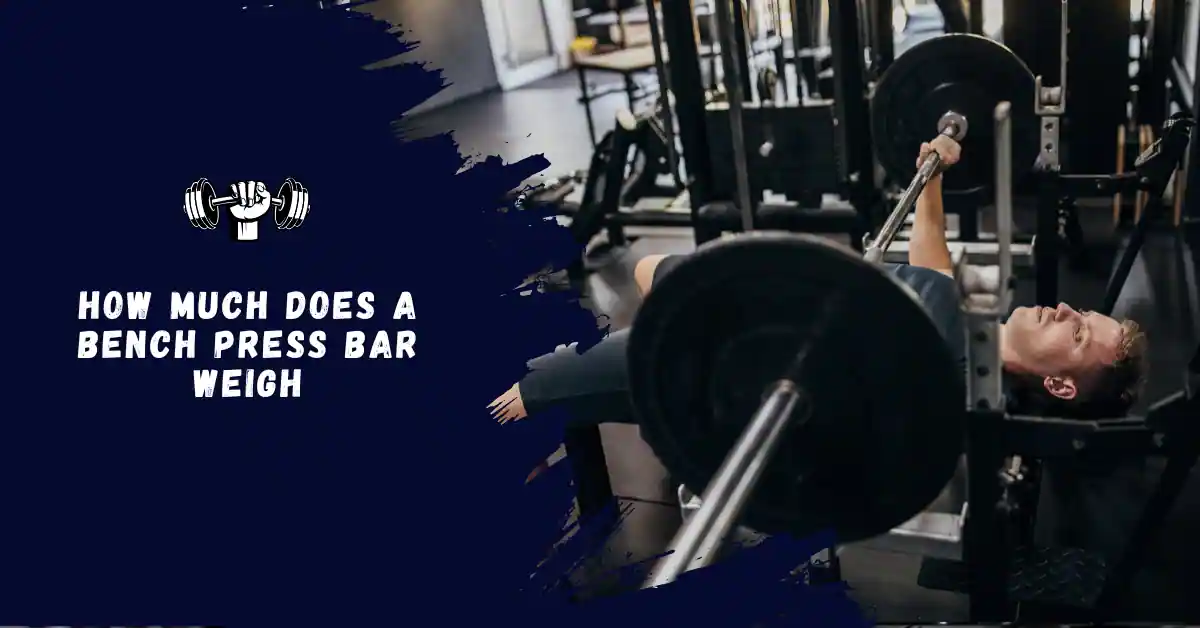When you step into the gym and approach the bench press, the bar itself might feel intimidating. You might wonder, how much does a bench press bar weigh? It’s a crucial question because understanding the bar’s weight is the first step to managing your lifts effectively and avoiding injuries. Let’s dive deep into the fascinating world of bench press bars and explore the different types, weights, and why they matter.
Table of Contents
ToggleWhat Is a Bench Press Bar?
Bench press bars are the long, metallic bars designed for lifting weights in various gym exercises. They’re specifically crafted to hold weight plates and provide a secure grip for lifters. But did you know not all bench press bars weigh the same? From standard bars to specialty ones, their weight varies significantly. If you’re new to fitness, consider reading about 20 fitness tips to boost your routine to get started on the right track.
Why Understanding Bar Weight Is Important
Knowing the weight of the bench press bar is crucial for tracking your progress. If you’re lifting without factoring in the bar’s weight, you’re not accurately assessing your strength. Plus, it ensures your safety by helping you select appropriate weights for your workout. However, not all bench press bars weigh the same—their weight depends on the type of bar and its purpose.
Types of Bench Press Bars
1. Standard Bench Press Bar
The standard bench press bar is the one most commonly found in commercial gyms.
- Weight: Typically weighs 20 kg or 44 pounds.
- Length: Around 7 feet long.
- Features: These bars have a knurled grip for better hold and can support up to 700 pounds of weight.
2. Olympic Bench Press Bar
Used in professional weightlifting and competitions, the Olympic bar is designed for heavy lifting.
- Weight: A standard Olympic bar weighs 20 kg (44 pounds).
- Length: Usually longer than the standard bar, about 7.2 feet.
- Features: Built to handle more weight, with a slightly higher tensile strength and rotating sleeves for reduced wrist strain.
3. Women’s Olympic Bar
This bar caters specifically to women lifters and is slightly lighter.
- Weight: Weighs 15 kg (33 pounds).
- Length: Shorter, around 6.5 feet.
- Features: Narrower grip diameter, making it easier for smaller hands to hold.
4. Training Bars
Ideal for beginners, these bars are lightweight and user-friendly.
- Weight: Between 5 to 15 kg (11 to 33 pounds).
- Features: Perfect for learning the correct form without the pressure of heavyweights.
If you’re just starting, pairing these with a best diet plan for weight gain can help maximize your strength gains.
5. Specialty Bars
Specialty bars are tailored for specific exercises like squats, deadlifts, or even bench presses.
- Examples: Swiss bars, trap bars, and safety squat bars.
- Weight: These vary widely, ranging from 15 to 30 kg (33 to 66 pounds).
Factors That Influence Bench Press Bar Weight
Material Composition
Bars made from high-grade steel are heavier and sturdier, while aluminum bars are lighter, often used for training purposes, akin to the lightweight approach of sore arms due to push-ups.
Bar Length and Diameter
Longer and thicker bars generally weigh more. Olympic bars, for instance, are longer and sturdier, accounting for their heavier weight.
Load Capacity
Bars designed to hold heavier weights, like powerlifting bars, are reinforced with additional material, increasing their weight.
How to Identify a Bench Press Bar’s Weight
Not sure how much does a bench press bar weigh? Here are some simple ways to find out:
- Check for Labels: Most commercial bars have their weight engraved or printed.
- Ask a Trainer: Gym staff can often provide accurate details.
- Use a Scale: If labels aren’t available, weigh the bar yourself for precise information.
Common Misconceptions About Bar Weight
1. All Bars Weigh the Same
This isn’t true! While many assume all bench press bars are 20 kg, specialty and training bars vary greatly in weight.
2. Bar Weight Doesn’t Matter
Every pound counts in weightlifting. Ignoring the bar’s weight can lead to inaccurate progress tracking and potential injuries.
How to Choose the Right Bar for Your Workout
Consider Your Goals
If you’re a beginner, opt for a training bar. Advanced lifters should go for Olympic or specialty bars depending on their specific exercise needs.
Check Compatibility
Ensure the bar fits the bench rack and weight plates available in your gym or home setup.
Safety Tips for Bench Pressing
1. Warm Up First
Always start with a light set to get your muscles ready and avoid strains.
2. Use Spotters
A spotter can save you from accidents if the bar becomes too heavy to handle.
3. Check the Bar’s Condition
Inspect for any damage or uneven knurling that might affect your grip or performance.
Conclusion
So, how much does a bench press bar weigh? While the standard weight is 20 kg (44 pounds), the answer varies based on the type of bar you’re using. From standard and Olympic bars to specialty bars, understanding these variations helps you lift smarter and safer. Whether you’re a beginner or a seasoned lifter, knowing the bar’s weight ensures accurate tracking and a solid foundation for your fitness journey.
For more tips on achieving your fitness goals, consider exploring how long does a muscle pump last to maximize your gym sessions.
FAQs
1. Can I use any bench press bar for my workout?
It depends on your fitness level and goals. Beginners might prefer lighter training bars, while advanced lifters often use Olympic or specialty bars.
2. Why do Olympic bars have rotating sleeves?
Rotating sleeves reduce the torque on your wrists during lifts, improving comfort and safety, especially for heavy lifts.
3. Are bench press bars universal in weight?
No, bar weight varies significantly based on type and purpose, ranging from 5 kg to 30 kg.
4. How can I verify my bar’s weight?
You can check for engraved labels, consult gym staff, or weigh it using a scale.
5. What’s the best bench press bar for beginners?
Training bars or women’s Olympic bars are excellent options for those just starting their fitness journey.






